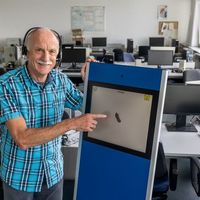Digital speech therapy for people who want to regain their speech after a stroke (aphasics): This is the aim of a research project that has now been launched at the Institute for Pattern Recognition in the Faculty of Electrical Engineering and Computer Science at Hochschule Niederrhein. The joint project Transsectoral Digital Speech Therapy (Translingo) aims to develop a self-sufficient speech training system that can supplement and partially replace costly and time-consuming therapy sessions.
"We are convinced that a digital speech training system will increase patients' motivation to regain their speech if it can be used in the clinic or at home," says Professor Dr. Hans-Günter Hirsch, who is leading the sub-project "Dialogue design with robust speech recognition for an aphasia speech training system" within the joint project at The Hochschule Niederrhein. The project will run for three years. The project, which has a financial volume of 486,000 euros, is funded by the Federal Ministry of Education and Research (BMBF).
The technical prerequisites for the project are robust automatic speech recognition and intelligent dialog design. The problem: existing speech recognition systems are not able to recognize the speech spoken by aphasics. Innovative approaches for the robust recognition of speech uttered by aphasics and their dialog design are therefore to be applied. For example, the parallel use of several recognition systems will be investigated in order to analyze speech utterances that contain hesitations, various linguistic artefacts and words or phrases that are not related to a question asked.
Example: The patient is shown a bag. His response: "uh ... hmm ... that could be uh that's a flap I think". The system recognizes the limited picture vocabulary, the German language and the sound sequences. The sentence is understood in the interpretation module and feedback is provided: "That's not a tab, it's a bag."
The use of artificial intelligence helps to adequately interpret the recognition results obtained in parallel. The aim is to learn how to interpret the results from the behavior of therapists in sessions. iPattern, the Institute of Pattern Recognition (iPattern) at The Hochschule Niederrhein, has been working in the field of speech recognition for many years and can apply the expertise it has built up in the project.
Students will be involved in the project in the form of degree and project assignments. Studies will be used for scientific apprenticeships in the field of teaching education. A doctorate is also conceivable; this can take place via the NRW doctoral college or in the form of a cooperative doctorate with a university.
Project partners are: St. Mauritius Therapy Clinic Meerbusch, TEMA Technologie AG Aachen, Heinrich Heine University Düsseldorf (Faculty of Medicine).


















